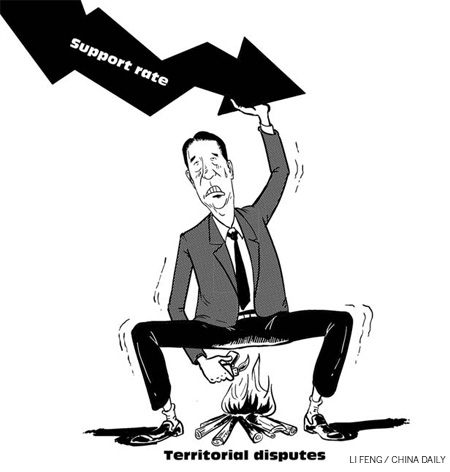View
Time for Japan to rethink home policy
Updated: 2011-03-10 07:58
By Li Wei (China Daily)
Japanese Prime Minister Naoto Kan named Takeaki Matsumoto as foreign minister on Wednesday after Seiji Maehara stepped down for receiving a campaign donation illegally. On Monday, Chinese Foreign Minister Yang Jiechi said that he would maintain good working relations with the next Japanese foreign minister no matter who is named for the post.
Yang's remarks highlight the importance of China-Japan relations. As he emphasized, "pursuing a sound Sino-Japanese relationship is a wise choice for both sides".
Hence, it was disappointing to see Japan lodge a formal protest earlier this week after a Chinese helicopter flew by Diaoyu Islands, which is an undisputable part of China's territory. China and Japan both should properly handle this sensitive issue. But it is especially important for Japanese politicians to prevent another row over the Diaoyu Islands.
The Japanese ruling party, Democratic Party of Japan (DPJ), should realize that it cannot win more domestic support by taking a hard stance on disputes with other countries. In fact, the DPJ started territorial disputes with China, the Republic of Korea and Russia to arrest its falling support base.
Before that, Japanese leaders including former prime minister Junichiro Koizumi used to visit Yasukuni Shrine, which honors Japan's war dead including class-A criminals in World War II, to arouse patriotism among supporters and get their renewed backing. But since the DPJ has vowed that its leaders will never visit the shrine, Naoto Kan and his cabinet colleagues resorted to territorial disputes to swell up its support and weather its political crisis.
Japan's Kyodo News Agency has reported that the Japanese government has started registering households on disputed islands to gain an upper hand in territorial disputes. By January, 520 Japanese households had transferred their registration to the disputed islands, including the South Kuril Islands (Chishima Retto as Japan calls it) and the Diaoyu Islands.
Despite that, the Kan administration has failed to increase its support rate.
The prevailing international situation has forced Japan to be "flexible" in its handling of such disputes. Japanese leaders have often adopted a hard stance initially and softened it gradually. From tensions with the United States over shifting of the Marine Corps Air Station in Futenma on Okinawa Island to the dispute with China over the Diaoyu Islands and the territorial dispute with Russia, Japan has used the same "flexible" diplomacy.
The chaos in Japan's diplomacy reflects the chaos in its internal politics. But the present situation can be blamed on the global strategy of the big world powers.
Since the 1980s, Japan has been seeking a new position and role on the global stage, for it believes that its present status no longer reflects it as a full-grown economic power. Japan wants to exercise its political influence as a "normal state", instead of being treated as a defeated country.
Japan began deliberating how it could improve its role in its alliance with the US, or whether it should continue the alliance at all after the DPJ came to power. The alliance has protected the island country for several decades. But it has also restricted Japan from playing the role that it wants to. So to prove that it is political power, Japan tried to exert pressure on its neighboring countries (and in some ways the world).
That explains why Japan has often vacillated between hard and soft diplomatic policies - neither internal politics nor diplomatic ties have been able to dominate its foreign policy.
Take Japan's territorial dispute with Russia for example. For Russia, the US, not Japan, is the main target when it comes to security strategy. The US' return to East Asia and the continuous expansion of the North Atlantic Treaty Organization in the East is squeezing Russia's strategic space. So Russia has to respond suitably to show that it's a reviving power.
To maintain its alliance as well as influence in East Asia, the US must support Japan in its disputes with Russia. In some sense, it has successfully directed Japan's diplomacy through regional crises.
But if Japan's actions hinder American goals in East Asia, like its strategy to deal with China, Washington will sooner than later force Tokyo to stop. Russia and the US are gaining the most from the situation. While Russia is strengthening its strategic arrangement in the Far East, the US is consolidating its alliance with Japan.
The DPJ, however, could not gain much by raising the disputes. The resignation of Maehara and the increasing pressure on Kan to quit or call snap polls show the "dispute card" didn't help DPJ politicians in their domestic political fight.
This calls for Japanese politicians to reflect on their tactics to win public support at home by playing the territorial-dispute card.
The author is director of and a research scholar with the Institute of Japan Studies, Chinese Academy of Social Sciences.

Specials

NPC & CPPCC sessions
Lawmakers and political advisers gather in Beijing to discuss major issues.

Self-made aircraft
An automobile mechanic in Northeast China made a test flight of his self-made aircraft which cost about US$395.

Venetian Carnival
Masked revellers celebrate in Saint Mark's Square in Venice.